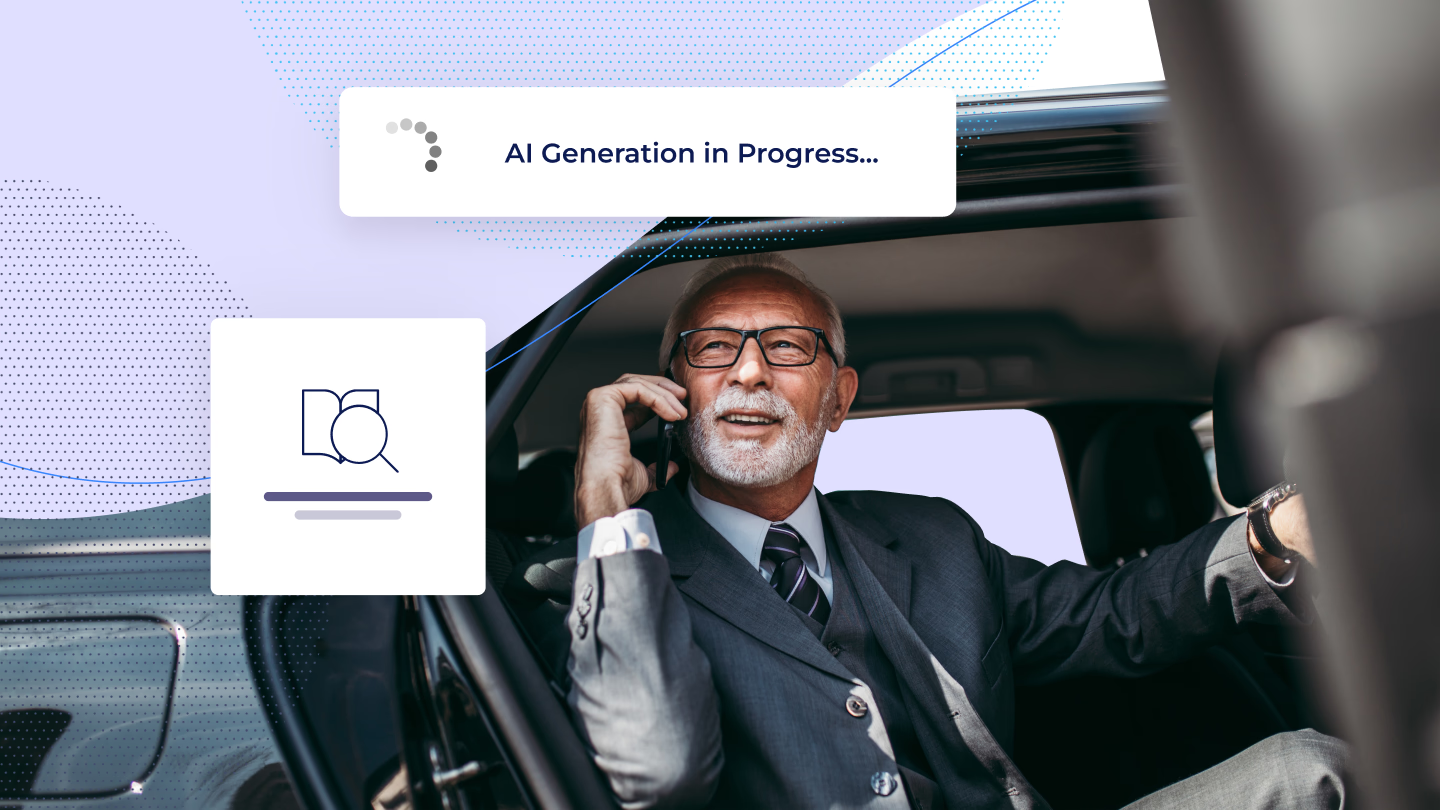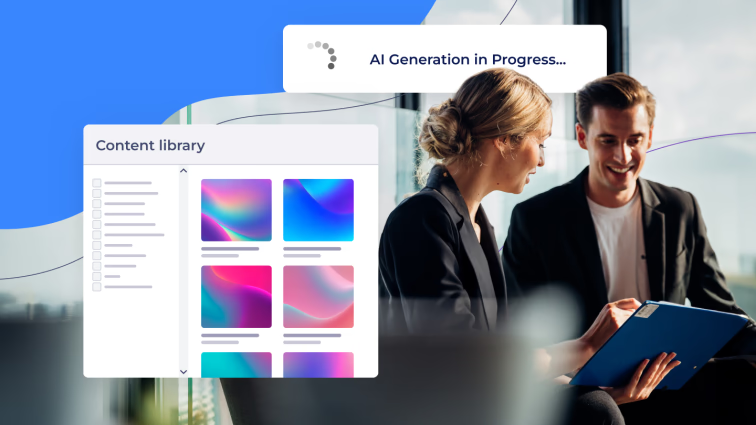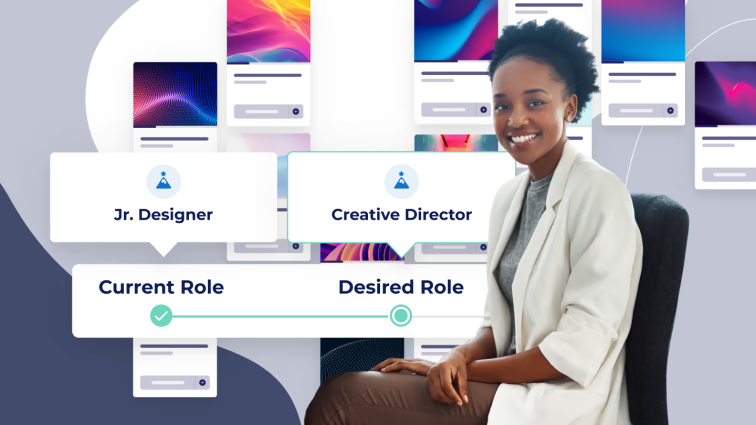AI is transforming how we learn at work, from onboarding and compliance to ongoing professional development. Companies and organizations are rethinking how they deliver training and turning to AI-powered learning management systems (LMS) to assist them.
An AI-powered LMS uses data and automation to personalize content, identify skill gaps, and streamline administrative tasks. The result is a faster, more relevant learning experience that activates employee engagement, performance, productivity, and organizations moving forward.
What is an AI-powered learning platform?
An AI-powered learning platform is an online training system that uses artificial intelligence (AI) technologies, such as machine learning (ML) and natural language processing (NLP) to personalize and enhance the learning experience. These platforms go beyond traditional learning management systems (LMS) by leveraging data and algorithms to make smart, real-time decisions that support each learner’s growth.
An AI LMS analyzes a learner’s behavior, performance, and preferences to deliver training content, assessments, and learning paths tailored to their specific needs. That might mean identifying knowledge gaps, adjusting the difficulty of training materials, or recommending next steps to keep learners on track.
Instead of a one-size-fits-all approach, AI-based platforms create a dynamic and responsive learning environment. They help individuals learn more effectively, retain more information, and improve performance, whether in a corporate, academic, or professional development setting.
Example: AI-powered learning in action
Imagine this: an employee uses an AI LMS to complete a series of compliance training modules. After the employee struggles with questions about data privacy, the platform recommends a refresher micro-course on data handling, provides a short video that breaks the topic down further, or suggests a coaching session on that topic.
Meanwhile, the platform recognizes that the employee excels in cybersecurity basics, so it recommends more advanced content to keep the employee engaged in that topic.
That's where AI shines most for L&D teams. Adaptive, data-driven learning and primed for your strategic goals.
What is adaptive learning?
Adaptive learning is a personalized approach to education that uses technology to tailor the learning experiences to each learner’s strengths, weaknesses, prior knowledge, pace, and preferences. Using adaptive learning, the LMS moves beyond static course delivery to guide learners along a unique path that is developed for them based on their behavior.
It uses algorithms and other AI tools to customize how content is delivered, resulting in a learning experience that changes between users based on how each person interacts with the material.
How it works: Better learning outcomes, minimal oversight
With AI-powered learning, you can implement a skills taxonomy and monitor learner performance at scale.
Let's walk through what it looks like:
Gathering data from the learner: The learner begins a course by completing a short assessment. Based on their performance, the platform recommends the appropriate level of tasks, learning activities, and resources.
Adapting to the learner's data: If the learner struggles in one area, the LMS might slow down, offer additional explanations, or suggest specific content. If they excel, the LMS might accelerate their progress or introduce more advanced material.
Continuous monitoring of the learner's competencies: Because all assessments, activities, and learning materials are hosted within the LMS, the platform continually monitors progress. As the learner engages more, the system collects more data and makes increasingly appropriate recommendations, offers more immediate feedback, and suggests targeted resources.
Ultimately, adaptive learning ensures no two learners follow exactly the same path. Instead, they all follow paths based on their unique needs. This closes knowledge gaps, improves retention, and supports each learner in achieving meaningful outcomes.
How is an AI-based LMS different from a traditional LMS?
Traditional learning management systems (LMS) are effective for delivering content and tracking completion. Where they struggle is in their reliance on static, one-size-fits-all course structures. Every learner follows the same path, regardless of their prior knowledge, learning style, or performance.
An AI-powered platform introduces flexibility and customization into the process. It uses machine learning and data analysis to adjust the learning experience based on how each user interacts with the platform.
Here’s the key difference:
Traditional LMS: Focuses on managing learning content and tracking progress. Everyone sees the same materials in the same order.
AI-based LMS: USes algorithms to personalize content, recommend next steps, identify knowledge gaps, and optimize outcomes for each learner individually.
What are the benefits of an AI-based LMS?
An AI-powered LMS offers more than smarter technology, it delivers real, measurable benefits for learners and organizations. By using data to shape the learning experience, these platforms help people learn faster, retain more information, and feel more supported along their learning journey.
Here are some key benefits:
Personalized learning paths
No two learners are alike, and an AI LMS reflects that. It builds unique learning journeys for each user, based on their performance, goals, and preferences. That means more relevant content, fewer wasted hours, and better results. Learners focus on the topics they need more instruction in and can move quickly through (or bypass entirely) those they already understand thoroughly.
Faster skill development
By identifying knowledge gaps and targeting them directly, AI reduces the time it takes for learners to build new skills. Learners don’t have to repeat what they already know or wade through irrelevant content, such as topics that aren’t related to their role or position.
Smarter assessments and feedback
Instead of just grading quizzes, an AI LMS interprets the data behind the answers. It can flag patterns of misunderstanding, suggest review materials, and offer real-time feedback to guide the learner in the moment.
Increased engagement and retention
Learners are more likely to stay motivated when content feels relevant and achievable. Adaptive recommendations, gamification, and intelligent reminders keep learners progressing and more likely to complete their training.
Actionable insights
Administrators and instructors get access to powerful analytics that tell them who’s struggling, who’s succeeding, what content works best, and where learners are dropping off. That allows for smarter decision-making across the organization.
Cost effectiveness
Automation, more efficient learning, and current data analytics save your organization money, time, and energy. Scalability An Al-powered LMS scales without compromising quality. Automation means less manual tracking, less administrative time, and more focus on support.
What are some key features of an AI learning platform?
AI-powered LMS platforms come packed with features designed to personalize the learning journey, streamline administration, and improve outcomes. Here are some of the most important features to look for:
Adaptive learning experiences: The system adjusts content delivery based on the learner’s performance, engagement, and preferences. This creates a more personalized and targeted learning experience. No more one-size-fits-all training.
Intelligent content recommendations: The platform suggests the next best module, video, article, or activity to take on based on what the learner has completed and how they performed. This keeps learners on track and engaged in the process.
Real-time feedback and smart assessments: AI analyzes how learners respond to quizzes, simulations, and interactive exercises. It offers real-time feedback and suggests additional resources when it detects misunderstandings or areas for improvement.
Predictive analytics: For administrators, AI tools highlight actionable data such as trends in learner behavior, predicted performance outcomes, and content effectiveness. These insights improve training programs over time.
Natural language processing (NLP): Some platforms use NLP to power chatbots, support conversational learning, or analyze written input from learners, adding another layer of personalization and responsiveness.
Learner segmentation: AI can group learners based on skill level, progress, goals, or even engagement patterns–helping instructors tailor communications, feedback, and interventions more effectively.
Multimodal learning support: Many platforms can recommend different types of content–such as video, audio, text, or simulations–based on how a user best learns. This makes the platform more inclusive and accessible.
What types of learning are best suited for AI-powered learning platforms?
AI-powered learning platforms are particularly well-suited to certain types of training, but they’re not always applicable. Understanding where they work best–and where a traditional model will work better–can help you choose the right tool for your needs.
Best suited for Ai-powered learning platforms
Skills-based training: This includes technical skills, software training, and compliance modules. AI can identify knowledge gaps quickly and tailor the content accordingly.
Continuous learning and professional development: For organizations that value lifelong learning, AI-powered platforms excel by creating evolving learning journeys. As users grow, so does the system’s understanding of what they need next.
Test prep and certification training: When learners are working toward a defined outcome, such as passing a certification exam, adaptive learning focuses study time where it’s needed most.
Self-paced, independent learning: Learners who prefer to move at their own pace benefit from the personalized recommendations, just-in-time support, and flexible pathways AI learning tools provide.
Large-scale or global training: AI learning tools standardize learning quality across regions and personalizes delivery for different languages, time zones, and learning styles.
Best suited for traditional LMS models
Instructor-led or workshop-style training: When the goal is to foster discussion, peer learning, or collaborative problem-solving, a traditional LMS paired with scheduled instruction may be more appropriate.
Conceptual or theoretical learning: Subjects that require deep discussion, open-ended exploration, critical thinking, or subjective learning (such ethics, philosophy, or strategic leadership) may benefit more from human facilitation than from algorithm-driven pacing.
Niche or custom workflows: Highly specialized training that’s not easily broken into data-driven pathways may be harder to optimize through AI.
The best AI-powered learning platforms
Here are some of the best AI-powered learning platforms.
1. Absorb LMS
.jpeg)
Absorb LMS is a cloud-based learning platform that uses AI to streamline learning and administration. Its Absorb Intelligence suite simplifies tasks for administrators, while the Intelligent Assist tool helps manage workflows using pre-configured data.
With Absorb Skills, learners can assess themselves against job-specific competencies, and the platform recommends tailored courses from the Amplify Max library.
Its AI-driven learning paths ensure each employee sees only the most relevant content based on their role, skills, and goals. Absorb also supports businesses in promoting reskilling and upskilling, making it a strong choice for workforce development.
2. Docebo
.jpeg)
Docebo leverages artificial intelligence to deliver personalized, scalable learning experiences. Its AI engine enhances content delivery by automatically tagging, recommending, and curating learning materials based on user behavior and preferences.
The platform’s Deep Search feature categorizes keywords, analyzes content, and provides relevant search results so learners find the content they need when they need it. Auto-Tagging software automatically tags learning materials based on phrases within the courses and materials, further enhancing their discoverability.
3. 360Learning
.jpeg)
360Learning blends LMS, LXP, and internal academy features to support upskilling and reskilling. AI-powered authoring simplifies the content creation process, enabling courses to be created in minutes.
AI also suggests custom quizzes based on course content. Courses can be translated with one click, access to data is limited, and videos are automatically transcribed, with transcriptions showing in search results so learners can easily discover relevant content.
4. EdCast by Cornerstone

An AI-powered Learning Experience Platform (LXP), EdCast by Cornerstone delivers highly personalized learning, skilling, and career mobility. Its AI engine curates content and delivers recommendations in the flow of work.
The platform’s SkillsDNA™ framework maps employee skills to roles, enabling adaptive learning paths and career development. EdCast also offers MyGuide, an in-app digital adoption tool that provides real-time guidance and automation.
5. TalentLMS
.jpeg)
TalentLMS streamlines course creation and personalizes learning experiences through AI. Its AI content generator, TalentCraft, allows users to create interactive training materials through simple prompts.
The platform also offers AI-assisted features such as grammar correction, tone adjustment, and translation. Organizations can use AI-powered skills mapping to align training with specific competencies and career paths.
6. Degreed
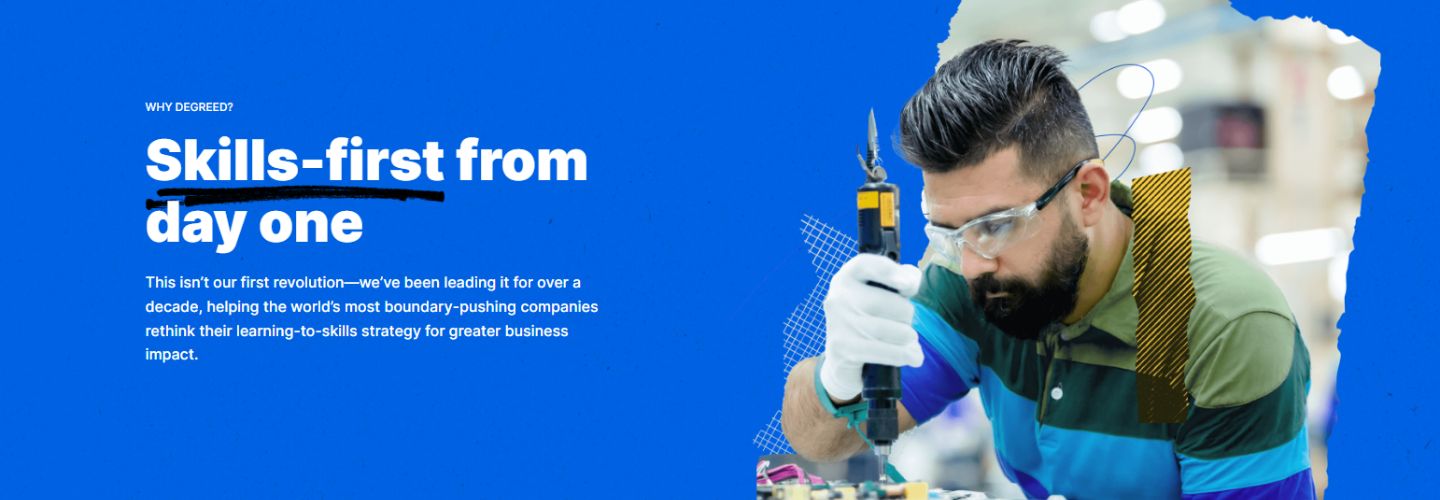
Degreed uses its AI engine, Degreed Maestro, to offer personalized coaching through text and voice, assisting users in skill assessments, career development, and leadership training.
The Maestro Studio facilitates organizations in creating custom AI-driven learning experiences, such as simulations. Skills+ maps employee skills to roles, facilitating upskilling and reskilling.
7. Sana Labs
.png)
Sana Labs consolidates LMS and LXP authoring on platform and offers AI-powered dashboards to enhance learning analytics. The platform uses AI to speed up content creation while learners can access their own AI tutor and personal coach to ensure they get the most out of their learning.
An AI learning analyst creates dashboards and answers performance-related questions.
8. Adobe Learning Manager

Adobe Learning Manager uses AI capabilities to personalize learning experiences, automate administrative tasks, and enhance learner engagement. AI analyzes various data points to provide tailored course suggestions that are relevant to each learner’s individual needs.
AI-driven widgets suggest recommended courses, trending content, and progress tracking, while discussion boards are moderated by AI, which ensures content remains on-topic.
9. LearnUpon
.jpeg)
LearnUpon is a cloud-based LMS designed to simplify training delivery and boost learner engagement across internal teams, partners, and customers.
The platform uses AI to create courses, summaries, exams, scripts, images, and translations, while interactive bots coach learners and tailor assessments. AI-powered recommendations personalize the learner experience and feedback can be automated.
10. Axonify
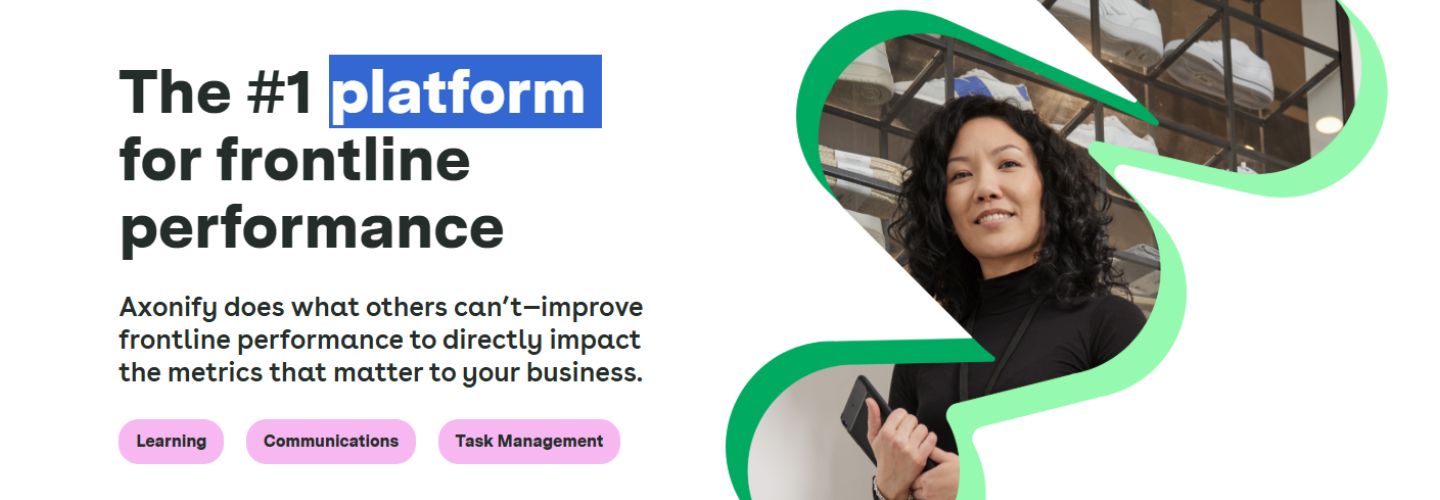
Axonify is a frontline-focused learning platform that uses AI to deliver personalized microlearning in 3-5 minutes a day. Its adaptive learning engine tailors content based on each employee’s performance, ensuring knowledge gaps are effectively addressed.
The platform’s generative AI assistant, Max, provides instant, context specific answers by scanning organizational resources.
11. Litmos
.jpeg)
Litmos is a cloud-based LMS designed for fast deployment, easy integration, and engaging learning experiences across a wide range of industries. Its AI-powered tools focus on automation and personalization. It uses AI to streamline course assignments, track learner progress, and recommend training based on role, performance, or behavior.
The platform also features built-in content authoring, rich analytics, and mobile-friendly access. AI video assessments analyze learners’ performance and generate data that enables administrators to identify performance trends.
12. Tovuti LMS

Tovuti blends robust functionality with user-friendly design. While it’s not as heavily AI-driven as some competitors, Tovuti incorporates smart automation to personalize learning paths and streamline administrative tasks such as enrolments and progress tracking.
It offers AI-powered content creation, interactive modules, and gamification features to keep learners engaged. Using AI, course creators can develop quizzes in seconds.
Lead your organization toward better performance with AI
AI-powered LMS platforms are reshaping how organizations deliver learning, making it more personalized, efficient, and aligned with business goals. From automating administrative tasks to building dynamic learning journeys that can be adjusted in real-time, these tools provide a strategic advantage.
Choosing the best platform for your organization starts with understanding your learners, your goals, and the support your team needs. Regardless of your priorities, there’s a solution on this list that can help you.
Ready to see what an AI-based LMS can do for your team? Book a personalized demo of Absorb today and get started on the path to strategic learning.




